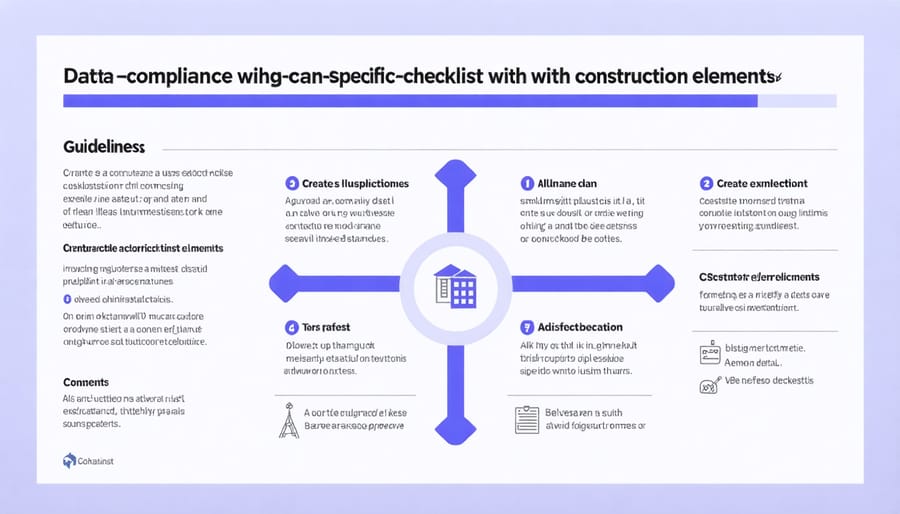Data privacy compliance in Virginia’s construction sector demands immediate strategic action following the Virginia Consumer Data Protection Act (VCDPA). Construction firms handling personal data from employees, contractors, and clients must align their operations with Virginia’s regulatory requirements by January 1, 2024, or face penalties up to $7,500 per violation.
For construction industry leaders, the VCDPA introduces critical obligations: implementing robust data mapping processes to track sensitive information across project management platforms, establishing clear consent mechanisms for collecting worker and client data, and maintaining comprehensive records of data processing activities. The law particularly impacts how construction companies handle biometric data from security systems, process employee information, and manage client data in building information modeling (BIM) systems.
Digital transformation in construction has amplified the importance of data privacy compliance. Project management software, IoT devices on construction sites, and cloud-based collaboration tools must now incorporate privacy-by-design principles. Construction firms must assess their current data handling practices, update privacy policies, and implement technical safeguards to protect sensitive information while maintaining operational efficiency.

Key Requirements of Virginia’s Consumer Data Protection Act (VCDPA)
Scope and Applicability in Construction
Construction companies operating in Virginia must carefully evaluate whether they fall under the Virginia Consumer Data Protection Act’s (VCDPA) jurisdiction. The law applies to businesses that conduct operations in Virginia or produce products or services targeted to Virginia residents, and either control or process personal data of at least 100,000 Virginia consumers annually, or derive over 50% of gross revenue from selling personal data while processing or controlling at least 25,000 Virginia consumers’ data.
For construction firms, this typically includes large-scale commercial contractors, residential developers, and construction management companies that maintain substantial customer databases. Key data points often collected include property owner information, project specifications, bid submissions, subcontractor details, and employee records.
However, smaller construction companies, specialty contractors, and trades that process limited consumer data may fall below these thresholds and thus be exempt from VCDPA requirements. It’s important to note that business-to-business transactions and employee data are generally exempt from the law’s scope.
Construction businesses should conduct a thorough data audit to determine their compliance obligations. This includes analyzing customer databases, digital marketing activities, and electronic payment processing systems. Companies near the threshold should implement monitoring systems to track their data processing volumes, as crossing these limits would trigger compliance requirements.
Consumer Rights and Business Obligations
Virginia’s data privacy law grants consumers several fundamental rights over their personal data, with corresponding obligations for businesses operating in the construction sector. Consumers can access their collected personal data, correct inaccuracies, and request deletion of their information. They also maintain the right to opt out of personal data processing for targeted advertising, sale, or profiling purposes.
Construction businesses must respond to verified consumer requests within 45 days, with a possible 45-day extension if reasonably necessary. Companies must provide clear mechanisms for consumers to exercise their rights, including at least two methods for submitting requests. For the construction industry, this typically includes both online forms and direct contact options.
Organizations must maintain detailed records of consumer requests and responses for 24 months. They must also provide transparent privacy notices describing data collection practices, processing purposes, and sharing procedures. Construction firms handling sensitive project data, client information, or employee records must implement appropriate technical safeguards.
Businesses processing personal data of 100,000 or more consumers annually, or deriving over 50% of gross revenue from personal data sales while processing at least 25,000 consumers’ data, face additional compliance requirements. These include conducting data protection assessments for high-risk processing activities and establishing clear data security practices.
Notable exemptions exist for certain business-to-business transactions and employee data, which may affect how construction companies handle contractor and workforce information.
Impact on Construction Data Management

Project Documentation and Client Data
When handling sensitive project documentation and client data in Virginia’s construction sector, firms must implement robust security measures that align with both state privacy laws and construction quality standards. Project managers should establish clear protocols for data classification, storage, and access control, particularly for personally identifiable information (PII) and proprietary design specifications.
Key requirements include maintaining detailed records of data processing activities, implementing encryption for digital files, and securing physical documentation in access-controlled locations. Construction firms must document their data handling procedures and regularly train staff on compliance requirements, including proper disposal methods for both digital and physical records.
For client data protection, companies should:
– Create comprehensive data inventories
– Implement role-based access controls
– Establish secure file transfer protocols
– Maintain audit trails for all data access
– Deploy encryption for sensitive communications
– Develop incident response procedures
When working with subcontractors, ensure written agreements include data protection clauses and verify their compliance with Virginia’s privacy requirements. Regular security assessments and updates to data handling protocols help maintain compliance while protecting sensitive project information from unauthorized access or disclosure.
Employee Data Protection
Construction companies in Virginia must implement robust measures to protect their employees’ personal data under the Virginia Consumer Data Protection Act (VCDPA). This includes safeguarding sensitive information such as social security numbers, compensation details, medical records, and performance evaluations.
Employers must maintain transparent data collection practices and inform workers about how their personal information is collected, stored, and used. Construction firms should develop clear privacy policies that outline data retention periods, access controls, and employee rights regarding their personal information.
Key requirements include obtaining explicit consent before sharing employee data with third parties, implementing secure data storage systems, and establishing protocols for data breach notifications. Companies must also ensure that any subcontractors or vendors handling employee information maintain equivalent data protection standards.
Construction organizations should regularly audit their data handling practices and maintain detailed records of data processing activities. This includes documenting the purposes for data collection, categories of personal information stored, and security measures in place.
Employees have specific rights under the VCDPA, including the right to access their personal data, request corrections, and opt out of certain data processing activities. Construction firms must establish procedures to handle these requests within mandated timeframes.
To ensure compliance, companies should designate data protection officers or teams responsible for overseeing employee data privacy measures and maintaining updated security protocols aligned with industry standards.
Vendor and Subcontractor Relationships
Under Virginia’s data privacy laws, construction companies must establish stringent controls over how they share data with vendors and subcontractors. The law requires organizations to implement comprehensive data protection protocols through formal contracts that clearly outline data handling responsibilities and security requirements.
These vendor agreements must specify:
– The type of data being shared
– Permitted uses and processing activities
– Security measures required to protect the data
– Incident response procedures
– Data deletion requirements upon contract termination
Construction firms must conduct thorough due diligence when selecting vendors, ensuring they have adequate security controls and compliance mechanisms in place. Regular audits of vendor practices are recommended to verify ongoing compliance with Virginia’s requirements.
For subcontractors specifically, prime contractors must establish clear data governance frameworks that cascade down through the supply chain. This includes implementing access controls, encrypting sensitive information, and maintaining detailed records of data transfers.
Companies should also require vendors to promptly notify them of any data breaches or security incidents that could impact shared information. The law mandates swift response times and specific notification procedures when personal data is compromised, making it essential to have these protocols clearly defined in advance.
Compliance Implementation Strategy

Data Inventory and Assessment
A comprehensive data inventory and assessment process is essential for construction companies to meet Virginia’s compliance requirements. Begin by cataloging all data collection touchpoints, including project management software, employee records, client information, and subcontractor databases. Document the types of personal data collected, storage methods, and retention periods for each category.
Create a detailed matrix that maps data flows through your organization, identifying how information moves between departments, third-party vendors, and project sites. This assessment should include both digital and physical records, considering the unique aspects of construction operations such as site access logs, safety certifications, and bid documentation.
Evaluate current data handling practices against Virginia’s specific requirements, focusing on sensitive personal information and project-specific data. Implementation of data classification systems helps prioritize protection measures based on data sensitivity levels. Consider using standardized assessment tools that align with industry best practices while meeting state-specific obligations.
Regular audits of data inventory should be conducted quarterly, with special attention to new technology implementations and changes in project documentation requirements. Document all findings and maintain updated records of assessment results, which will prove invaluable during compliance reviews and help demonstrate due diligence in data protection efforts.
Privacy Policy Updates
Construction companies must establish a systematic approach to updating their privacy policies and procedures to maintain compliance with Virginia’s data privacy laws. Regular reviews should be conducted at least annually, with additional updates triggered by significant operational changes or new regulatory requirements.
Key elements of your privacy policy update process should include a comprehensive review of data collection practices, processing activities, and security measures specific to construction project data. This includes examining how you handle sensitive information such as bid documents, employee records, and subcontractor agreements.
Document all policy changes and maintain a version history that tracks modifications. Establish a clear approval process involving key stakeholders from legal, IT, and operations departments. Construction firms should pay particular attention to updates regarding data sharing with project partners, automated processing systems, and cloud-based construction management platforms.
Communicate policy updates effectively to all employees, contractors, and business partners. Implement a training program to ensure staff understands new requirements and procedures, especially those handling sensitive project data or customer information.
Consider creating a dedicated privacy team or appointing a privacy officer responsible for ongoing compliance monitoring and policy updates. This team should stay informed about industry-specific privacy challenges and emerging technological considerations in construction operations.
Remember to review and update associated documents such as vendor agreements, data processing contracts, and internal procedures to maintain alignment with your revised privacy policies.
Technical Safeguards
The Virginia Consumer Data Protection Act (VCDPA) mandates specific technical safeguards that construction companies must implement to protect sensitive data. Organizations must establish and maintain reasonable administrative, technical, and physical security practices appropriate to the volume and nature of personal data being processed.
Key technical requirements include implementing encryption for data both at rest and in transit, particularly for project documentation, employee records, and client information. Construction firms must deploy access control systems that restrict data access to authorized personnel only, using multi-factor authentication for sensitive systems and applications.
Network security measures should include properly configured firewalls, regular security patches, and continuous monitoring systems to detect and prevent unauthorized access. Companies must also maintain secure backup systems and implement disaster recovery protocols to ensure data availability and integrity.
For mobile devices and field equipment containing personal data, organizations need to implement mobile device management (MDM) solutions and ensure secure remote access capabilities. Cloud storage solutions used for project data must meet VCDPA compliance requirements through appropriate security configurations and data processing agreements.
Regular security assessments and vulnerability testing are essential components of maintaining adequate technical safeguards. Construction companies should document all security measures and maintain audit trails of system access and data processing activities to demonstrate compliance with VCDPA requirements.
Training programs for staff on proper data handling and security protocols complete the technical safeguards framework, ensuring that human factors don’t compromise the implemented security measures.
Construction industry professionals must act swiftly to ensure compliance with Virginia’s Consumer Data Protection Act (VCDPA) as key deadlines approach. By January 1, 2024, all qualifying construction companies operating in Virginia must have comprehensive data protection measures in place.
Priority action items include conducting thorough data audits, updating privacy policies, and implementing robust data security protocols. Construction firms must particularly focus on securing project documentation, employee records, and client information stored in digital formats.
Key compliance requirements include:
– Establishing clear processes for handling consumer data requests
– Implementing data minimization practices
– Creating detailed data processing agreements with vendors
– Developing incident response plans
– Training staff on new data handling procedures
Construction companies should prioritize securing sensitive project data, including blueprints, bid documents, and client specifications. Special attention must be given to protecting personal information collected through smart building systems and IoT devices on construction sites.
For ongoing compliance, organizations should:
– Conduct quarterly compliance audits
– Update data protection measures as technology evolves
– Maintain detailed records of all data processing activities
– Regularly review and update vendor agreements
Failure to meet these requirements by the deadline could result in significant penalties. Construction firms should consider engaging legal counsel specializing in data privacy to ensure full compliance with the VCDPA’s requirements while maintaining operational efficiency.

